|
Books Should Be Free Loyal Books Free Public Domain Audiobooks & eBook Downloads |
|
|
Books Should Be Free Loyal Books Free Public Domain Audiobooks & eBook Downloads |
|
Author Collection |
|---|
By: G. K. Chesterton (1874-1936) | |
|---|---|
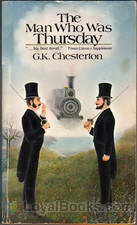 The Man Who was Thursday
The Man Who was Thursday
Two poets in a London park at sunset, debating on the attributes of poetry and whether it's really a metaphor for anarchy. A group that meets in secret, planning to overthrow the world order. Disguises and deceptions, ideals and ideology. A medley of themes and genres makes this a great read for anyone who's a fan of Chesterton and his iconic Father Brown. The Man Who Was Thursday includes Chesterton's favorite theme of Christianity with touches of delightful humor to enliven the twists and turns that abound throughout the book... | |
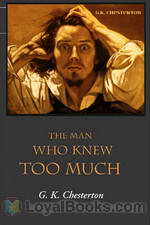 The Man Who Knew Too Much
The Man Who Knew Too Much
Robbery, murder and treason. Strange happenings in quiet English villages. A book critic who happens to find a corpse with its head crushed, an Irish freedom fighter framed for a crime, the disappearance of a valuable coin, a strange dispute over a property claim and a host of other intriguing situations make up the contents of G K Chesterton's collection of short stories The Man Who Knew Too Much. For fans of Chesterton's immortal clerical sleuth, Father Brown, these stories are equally delightful and intricately wrought... | |
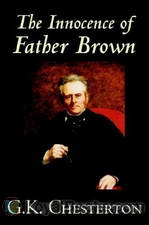 The Innocence of Father Brown
The Innocence of Father Brown
A Chief of Police hosts a dinner party for an American millionaire wishing to will his entire fortune to the Church of France. Jewels that have been stolen and recovered so many times that they're known colloquially by thieves as The Flying Stars. A murder committed by an invisible man. These and many others are the mysteries that are presented to the lovable, bumbling, stumpy Man of God, Father Brown. The Innocence of Father Brown, by G.K. Chesterton is a collection of eleven stories which marks the debut of this most unusual detective... | |
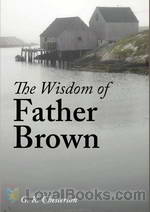 The Wisdom of Father Brown
The Wisdom of Father Brown
The Wisdom of Father Brown explores many characters and fascinating themes such as the following. An eminent criminologist is persuaded by the mild yet persistent Father Brown to sort out a family matter. Also, a Tuscan poet fancies himself as the King of Thieves. A famous French philosopher and atheist holds the key to a new invention called “Noiseless Powder.” A corpse is discovered in a dark passage backstage at London's Adelphi Theater. Finally there is Psychometric testing of criminals in Chicago... | |
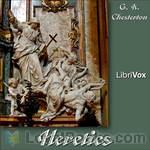 Heretics
Heretics
The Author Gilbert Keith Chesterton was born in London, England on the 29th of May, 1874. Though he considered himself a mere “rollicking journalist,” he was actually a prolific and gifted writer in virtually every area of literature. A man of strong opinions and enormously talented at defending them, his exuberant personality nevertheless allowed him to maintain warm friendships with people–such as George Bernard Shaw and H. G. Wells–with whom he vehemently disagreed. Chesterton had no difficulty standing up for what he believed... | |
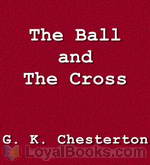 The Ball and the Cross
The Ball and the Cross
The Ball and the Cross is G. K. Chesterton's third novel. In the introduction Martin Gardner notes that it is a "mixture of fantasy, farce and theology." Gardner continues: "Evan MacIan is a tall, dark-haired, blue-eyed Scottish Highlander and a devout Roman Catholic.... James Turnbull is a short, red-haired, gray-eyed Scottish Lowlander and a devout but naive atheist.... The two meet when MacIan smashes the window of the street office where Turnbull publishes an atheist journal. This act of rage occurs when MacIan sees posted on the shop's window a sheet that blasphemes the Virgin Mary, presumably implying she was an adulteress who gave birth to an illegitimate Jesus... | |
 The Flying Inn
The Flying Inn
The Flying Inn is a novel first published in 1914 by G.K. Chesterton. It is set in a future England where a bizarre form of "Progressive" Islam has triumphed and largely dominates the political and social life of the country. Because of this, alcohol sales are effectively prohibited. The plot centers around the adventures of Humphrey Pump and Captain Patrick Dalroy, who roam the country in their cart with a barrel of rum in an attempt to evade Prohibition, exploiting loopholes in the law to temporarily prevent the police taking action against them. | |
 Everlasting Man
Everlasting Man
This book needs a preliminary note that its scope be not misunderstood. The view suggested is historical rather than theological, and does not deal directly with a religious change which has been the chief event of my own life; and about which I am already writing a more purely controversial volume. It is impossible, I hope, for any Catholic to write any book on any subject, above all this subject, without showing that he is a Catholic; but this study is not specially concerned with the differences between a Catholic and a Protestant... | |